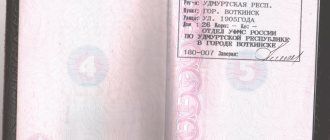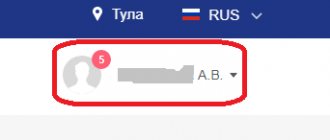One can only guess how the prejudice appeared and took hold that it is immeasurably more difficult to leave an individual house than to leave an apartment. That for this it is necessary to collect significantly more documents.
Perhaps it dates back to Soviet times, when almost all apartments were owned by the state, and houses could be private.
To register a residence permit, they required a “house book” - a special type of document, about which most people had only the most approximate idea. And when they heard that in order to deregister, an “extract from the house register” was needed, people fell into a slight panic, not understanding where to get it.
Then the situation with home ownership changed, and the concept of “house register” remained in the regulations for registration and deregistration. Continuing to scare those who want to register or cancel registration at a particular address in the private sector.
We would like to reassure you right away - leaving a private house is no more difficult than leaving an apartment (privatized or municipal). This article is dedicated to this issue.
First about the house book
To “dot the t's” - in 2021 there are no more house books in Russia. They were abolished a little earlier, during the transfer of functions of registration of citizens from one department to another.
But in fact, it was a document necessary for a private homeowner, and kept by him.
Since private houses were never part of the state housing stock, some housing authorities did not keep records of registration and check-out of their residents. They only prepared the house register, and then the owner of the house made all the entries himself.
Finding a house register sometimes really became a problem. If a family lived in a house for decades, without registering or registering anyone, they forgot about the book, and it could get lost. This happened especially often with houses received by inheritance. Obtaining a duplicate was not particularly difficult, but the trouble was that the duplicate was “clean”, and it was really difficult to restore the history of registrations and extracts at this address.
But let’s return to our time, to the norms that are relevant at the moment.
Until 2021, registration/discharge was handled by the FMS - Federal Migration Service. Currently – UVM (Office for Migration Issues). Accordingly, the administrative regulations changed and there was a transition to electronic document management. This happened in accordance with Order of the Ministry of Internal Affairs No. 984. The order came into force in April 2021. Now you don't need to keep a house register. And receive extracts from it too.
All information about residents is stored electronically in the Department of Internal Affairs of the Ministry of Internal Affairs, and from there it is taken by everyone who needs it and who has the right to receive this information by law.
So no one has the right to demand from a citizen an extract from the house register. Registration is confirmed by an adult’s passport and a special registration certificate for children issued by the Housing Office.
Nuances of extracting debts from:
Municipal apartment
It is not difficult to leave a municipal apartment with debts. Registrars do not have the right to refuse registration solely on the basis of debts. As we found out above, these are two different categories. Extract is possible with a joint personal account . The person responsible for payment is the tenant of the municipal apartment. The remaining residents are jointly and severally liable, but can be discharged without any problems.
Privatized apartment
Both the owner and the residents can issue an extract from a privatized apartment. Arrears on rent or other payments do not become an obstacle. It also does not matter which apartment the citizen is registered in - burdened with debts or without debts.
Moreover, the seller of an apartment with debts can sell the home. The most important thing is to notify the buyer about the arrears, and, if the latter does not mind, record information about the debt in the purchase and sale agreement (see “Is it possible to sell an apartment with utility debts”).
Is it possible to leave home?
In order to be discharged from somewhere, you first need to register there. So, first of all, let’s find out how you can end up registered in a private house?
This is done in agreement with the owner, and is not much different from registration in an apartment. You can conclude a temporary residence agreement with the owner and, on this basis, register temporary registration in his house.
You can register on a permanent basis, with the consent of the owner of the house and in accordance with the provisions of Government Decree No. 713 (of 1995).
- If the registration is temporary, it will expire when it expires. Registration can be canceled prematurely in court if the tenant has violated the terms of the contract or the rule of law.
- If a citizen is registered on a permanent basis, he can either leave at will or be forcibly deregistered through a legal process initiated by the owner.
The owner must have valid grounds for forced eviction, as specified in the statement of claim. For example, a registered citizen’s refusal to pay utility bills, his antisocial behavior, which makes it impossible to live with him in the same apartment, or his commission of a criminal offense.
Possible reasons
Registration authorities record the constant migration of the population. Some people move within Russia, others leave the country, thousands of foreigners arrive in the Russian Federation every month. Each person has his own reasons for changing his place of residence. The most common reasons for a radical change of registration are:
- Improving living conditions, in which one premises is sold and the second is purchased.
- The need to move due to a change in workplace.
- Refusal of the owner to continue living in the registered area. There may be various reasons here, from sale to a banal divergence of interests and reluctance to further contact with the registered ones, especially if they are not related to the owner.
- Confiscation of property due to outstanding loan obligations.
Each reason presupposes the possibility of being discharged to nowhere, especially since the law does not prohibit this action, but only limits the person in the time frame for registering at a new place of residence.
Moving to another city or country
Population migration is a constant process. Some are leaving Russia, others, on the contrary, are moving to it from other countries. Within the territory of the Russian Federation, migration movement is also constantly observed, the population changes cities or even federal districts.
According to statistics, every year millions of people move from one place of residence to another.
This happens for many reasons, but most often the reasons for a radical change of city or country are:
- Change of marital status. Families are created or, conversely, broken up, which leads to relocation.
- The search for a “better life” when people move to different climatic and economic conditions.
- Invitation from the employer.
- There is a category of citizens who migrate just like that, to gain new impressions and emotions.
When changing cities, a citizen can check out in advance to nowhere, and then decide on the spot on the new registration address. People can also be registered without prior registration; then, upon registration, they are automatically removed from the previous one. But if you change your country of residence, such a choice is impossible. An emigrant will first have to check out in one country and then register in another, and this will have to be done all within the same seven-day period.
Participation in shared construction
The desire to improve their living conditions forces people to look for opportunities to realize this dream. One of the common ways is to participate in shared construction. It requires constant material investments. Typically, the future home owner contributes a certain amount at once, and the remaining expenses are divided into equal shares and paid with a certain regularity. Without sufficient personal savings, many have to sell their existing housing to make contributions. And the sale of the premises, of course, involves deregistration.
When participating in shared-equity construction, you should be clearly aware that the time frame before receiving a new living space is quite long, in addition, many developers do not fit into the established periods, and therefore you will have to wait even longer. But all this time the person must be registered somewhere. This issue can be resolved in various ways. You can make a temporary registration or register permanently with relatives or friends.
Selling an apartment
Selling an apartment if it is the only piece of real estate does not seem to be a particularly good idea. But such deals are quite common. People sell their living space to buy a new one or invest money in a business, or for other reasons. Be that as it may, before finalizing the transaction, you should consider a further plan of action. Even if the reason for the sale is the purchase of a new home, the likelihood that it will be possible to complete two transactions in the shortest possible time and register at a new place of residence within 7 days is extremely low. Typically, much more time passes between the sale of one property and the purchase of another. But buyers of old apartments generally do not want to wait for the checkout. However, this issue can be resolved in several ways:
- Temporarily register elsewhere.
- Agree with buyers to extend registration for a strictly established period.
When selling an apartment or house, the issue of registration to nowhere will affect not only the owner of the property, but also those persons who were registered there.
Owner's requirement
The owner of the property can dispose of it at his own discretion. He can sell, exchange, donate or rent out his apartment. Owners are able to make decisions about who should be registered in the premises. Based on this logic, it is easy to assume that the issue of registration is also regulated by the person who owns the square meters.
The owner of an apartment may at any time demand the deregistration of one or more persons registered in it. At the same time, the search for a new place of registration is not within his competence; it is the residents who must take care of this. Residents can urgently check out to nowhere and then look for a solution to the problem that has arisen, or, by agreement with the owner, first find a new place of registration, and only then check out. The second option is sometimes the only possible one, for example, when it comes to discharge of minor children. According to existing legislative norms, it is impossible to deregister children without indicating a specific address for their next registration.
Can this be done without the owner?
The voluntary discharge of a tenant does not require permission or approval from the owner of the house. Not only does it not need to be taken with you to the Department of Internal Affairs of the Ministry of Internal Affairs, but it is also not necessary to notify you that you are being discharged. In principle, you can even “skip” the deregistration operation itself - just submit an application for registration at a new address.
The UVM inspector who accepted the application will himself send a request, according to which the citizen will be removed from his previous registration address.
It is impossible to register in a private house without the consent of its owner. To obtain registration, you will need his written consent and presence when applying for registration. And you can even sign out with a power of attorney.
Example
Citizen A, living as a lodger in the private house of owner B in Ryazan, was sent on a long business trip to Moscow, where he required temporary registration. Not wanting to make an extra trip to Ryazan for discharge, A called his friend S. He agreed with him about assistance, after which he sent S a notarized power of attorney, an application for discharge, and his passport. S submitted an application for A’s discharge to the Department of Internal Affairs, handed over his passport, and then received it back with a discharge stamp. And sent it by courier to Ryazan.
The question may arise, why was all this necessary for A, if he could simply submit an application for registration at a new address, and the Department of Internal Affairs itself would remove him from the old registration? Simply because this operation would take more time. The request would have gone through unhurried “bureaucratic” channels from Moscow to Ryazan, stayed there for the duration of processing, and then returned back the same way. All this time, A would have to do without a passport, having only a temporary identity card, which is not always convenient. Extract in person (or by proxy) took only 3 days.
Important nuances and conditions for discharge
- You can check out “to nowhere” , i.e. It is not necessary to register in the new housing immediately - read more. There is no liability for this.
- They are not issued by power of attorney .
Now there is no point in filling out a notarized application for an extract + power of attorney for anyone who submits this application. The service will still be refused. Only personal presence and submission of documents - clause 90 of Order of the Ministry of Internal Affairs N 984. There are several ways out of the situation: 1) You can apply for an extract at the place of actual residence. To do this, through your personal State Services account, you must first make an appointment at the regional Ministry of Internal Affairs at your place of actual residence - instructions. There is no other way. 2) Or register at a new address, then they will automatically write you out from the previous one - instructions. - There is no prohibition on discharge if there are debts on utility bills - more details. But it is worth remembering that the debts will not go away and they will still hang on the discharged citizen.
- If a citizen is discharged from someone else’s home, nothing is required from the owners - neither their presence nor any documents. I described the details here.
A small digression - if you need a free consultation, write online to the lawyer on the right or call (24 hours a day, 7 days a week) Moscow and the region; St. Petersburg and region; 8 (800) 350-24-83 — all regions of the Russian Federation.
What do you need to know?
- From 2021, an extract from the house register is no longer needed to deregister, since the maintenance of house registers has been cancelled.
- You can check out from your old address at the same time as registering at your new address. If you are deregistering due to the sale of real estate (house), it is better to start the procedure in advance. The purchase and sale agreement is concluded for a house where no one is registered.
- To register at a new address, you need a title document for the property, the consent of the homeowner, a social tenancy agreement, or another document giving the right to register at this address.
- Moving to a private house, accompanied by registration, requires the consent of the property owner (if it is not you). The owner's consent must be dated the same day on which the tenant submits an application for registration.
- You can issue an extract not at the Department of Foreign Affairs, but at the MFC (GBU “My Documents”). The operating hours of the MFC are more convenient, and there are no queues. But it will take more time to deregister. The deadline at the UVM is 3 working days, and through the MFC - 6 working days, that is, according to the calendar - more than a week.
- An incapacitated citizen can be discharged from home only with the consent of the guardianship and trusteeship authority.
- Children and disabled people cannot be discharged not only “to nowhere,” but also “to anywhere.” Their future housing must be approved by the guardianship authority. Living conditions in the premises where children and disabled people will be registered must be no worse than the previous ones. This means that even if you find an option that is suitable from your point of view, you cannot be sure that the guardianship authorities will find it equally suitable. There is always a risk of receiving a ban on the discharge of a child or disabled person from the guardianship authority.
So, we have dealt with the important strategic aspects of leaving a private home. Let's move on directly to the registration procedure.
Instructions. Method number 1 - check out “to nowhere”
You only need to submit an application for an extract to the migration department of the district Ministry of Internal Affairs at the address of your actual residence. There is no point in contacting the local passport office or MFC, because they are assigned only to their district/city - the list of responsible persons is in Decree of the Government of the Russian Federation of July 17, 1995 N 713.
Other articles
Have you bought an apartment? Then you can get back up to 260,000 rubles - all about the tax deduction. If you bought with a mortgage, then up to 650,000 rubles - deductions for the mortgaged apartment
I advise you to make an appointment in advance at the regional Ministry of Internal Affairs through the State Services portal , because they will let you choose a specific day and time - instructions below. Of course, you can also make an appointment by phone or just come to the Ministry of Internal Affairs - clause 91 of Order of the Ministry of Internal Affairs N 984. In practice, firstly, it is not always possible to find the department’s current phone number on the Internet; they often don’t answer the phone and are reluctant to give advice on it. Secondly, if you come without an appointment, you will most often have to wait in a queue, which also includes those who signed up in advance.
Although you can submit an electronic application through State Services, you will not be able to do this if you are discharged from another city. The portal will automatically submit an application to the district Ministry of Internal Affairs at the registration address and it cannot be changed.
You are allowed to make an appointment only from your State Services profile, because only the applicant can be the recipient of the service - clause 91 of Order of the Ministry of Internal Affairs N 984 and clauses. e p. 1 of Resolution N 861. You will have to register if you have not done so before - instructions from the service. You can verify your identity through your bank, local Service Centers or post office.
You can use the service through the website or mobile application. The instructions are the same. I will show you through the website because it is easier and more clear to fill out the information.
- Follow the link to the State Services website and log into your profile. Click on “Personal Account”, enter your username and password and click the “Login” button.
(to enlarge the picture, click on it) - At first indicate your actual residence address in your profile, if you haven't done so before. To do this, click on your full name in the right corner, then on “Documents and data”.
- Below in the "Addresses" section click on “Edit”, enter the address of your actual residence and click on “Save”. We do not change the permanent registration address.
- Follow the link to make an appointment at the Ministry of Internal Affairs and “Get Started”.
- Click on “Registration at place of residence” and “Stop registration”.
- We confirm phone and email. Now you need to select the Ministry of Internal Affairs. At first indicate the desired city or region and click “Correct”.
Using the map or search, we find the Ministry of Internal Affairs we need and click “Select” on the right .
- Click “Make an appointment”, then in the calendar select date and time and again click on the “Make an appointment” button.
- Click “To your personal account”, go to the message “Registration confirmed” and remember the service PIN code.
- Visit the Ministry of Internal Affairs at the appointed time.
I advise you to arrive at least 15 minutes in advance. If there is an electronic queue terminal there, you need to enter the PIN code you received earlier. If there is no terminal, we provide the PIN code to the employee accepting applications.It is enough to submit only your passport and its copy - clause 54 of Order of the Ministry of Internal Affairs N 984. Nothing else is required. You need to fill out an application for an extract using the form provided - or a completed sample. They may be required to indicate the address of their actual residence. Don’t worry, they won’t register at this address anyway and you don’t need to submit documents for it.
An employee of the Ministry of Internal Affairs will collect the application with the passport and inform you when it can be collected.
- Within three calendar days, you can pick up a passport with a deregistration stamp - clause 36 of Order of the Ministry of Internal Affairs N 984. In practice, they usually invite you the next day.
The procedure is completed. Partial instructions taken from here.
Other articles
Privatization of an apartment - laws, instructions, expenses
How to leave a private home?
The procedure itself is standard, similar to deregistration from an apartment. A citizen should submit an application for deregistration, attach a passport to it, wait until the documents are completed, and receive a passport with a stamp deregistration.
Deregistration is possible in various ways:
- Automatically, when applying for registration at a new address
- Without indicating a future address (“to nowhere”)
- By power of attorney issued to another person
- Online through the State Services portal (you will still have to go to the Department of Internal Affairs of the Ministry of Internal Affairs with your passport, but only once - to set a discharge stamp)
Discharge a person from an apartment without his consent
Author: Anatoly Antonov, October 15, 2021 at 23:45 Good afternoon!
Deregistration (“extract”) without the consent of a person is possible only if this person does not have a share in the ownership of the apartment. But even in the absence of a share, this is only possible in court if there are the following grounds (clause 31 of the Decree of the Government of the Russian Federation of July 17, 1995 N 713 “On approval of the Rules for registration and deregistration of citizens of the Russian Federation at the place of stay and at the place of residence within Russian Federation": Removal of a citizen from registration at the place of residence is carried out by the registration authorities in the event of: a) change of place of residence - on the basis of a citizen’s application for registration at a new place of residence or an application for deregistration at the place of residence (in writing or in the form of an electronic document). When registering at a new place of residence, if the citizen has not deregistered at his previous place of residence, the registration authority is obliged to send a corresponding notification to the registration authority at the citizen’s previous place of residence within 3 days to remove him from registration;... d) recognition as missing - on the basis of a court decision that has entered into legal force; e) death or declaration of death by a court decision - on the basis of a death certificate issued in the manner prescribed by law; f) eviction from an occupied residential premises or recognition as having lost the right to use residential premises - on the basis of a court decision that has entered into legal force; g) detection of untrue information or documents that served as the basis for registration, as well as unlawful actions of officials when deciding the issue of registration - on the basis of a court decision that has entered into legal force; h) changes by the citizen specified in paragraph 26(1) of these Rules of nomadic routes, as a result of which such routes began to pass beyond the boundaries of the municipal district at the address of the local administration of the settlement of which he is registered at the place of residence - based on the citizen’s written application with the attachment of a document confirming that the citizen maintains a nomadic and (or) semi-nomadic lifestyle; ... j) revealing the fact of fictitious registration of a citizen at the place of residence in the residential premises in which this citizen is registered - on the basis of a decision of the registration authority in the manner established by the Ministry of Internal Affairs of the Russian Federation. According to Article 31 of the Housing Code, family members of the owner of a residential premises include his spouse living together with this owner in the residential premises belonging to him, as well as the children and parents of this owner. Other relatives, disabled dependents and, in exceptional cases, other citizens may be recognized as members of the owner’s family if they are settled by the owner as members of his family. Family members of the owner of a residential premises have the right to use this residential premises on an equal basis with its owner, unless otherwise established by an agreement between the owner and members of his family. Family members of the owner of a residential premises are obliged to use this residential premises for its intended purpose and ensure its safety. Members of the family of the owner of a residential premises who are capable and limited by the court in their legal capacity are jointly and severally liable with the owner for the obligations arising from the use of this residential premises, unless otherwise established by agreement between the owner and members of his family. In the event of termination of family relations with the owner of a residential premises, the right to use this residential premises for a former family member of the owner of this residential premises is not retained, unless otherwise established by an agreement between the owner and the former member of his family. If a former family member of the owner of a residential premises has no grounds for acquiring or exercising the right to use another residential premises, and also if the property status of a former family member of the owner of a residential premises and other noteworthy circumstances do not allow him to provide himself with another residential premises, the right to use the residential premises owned by the specified owner may be retained by a former member of his family for a certain period based on a court decision. In this case, the court has the right to oblige the owner of the residential premises to provide other residential premises for the ex-spouse and other members of his family, in whose favor the owner fulfills alimony obligations, at their request. Upon expiration of the period of use of residential premises established by a court decision taken taking into account the provisions of Part 4 of this article, the corresponding right to use the residential premises of a former family member of the owner is terminated, unless otherwise established by agreement between the owner and this former member of his family. Before the expiration of the specified period, the right to use the residential premises of a former family member of the owner is terminated simultaneously with the termination of the ownership right to this residential premises of this owner or, if the circumstances that served as the basis for maintaining such a right have ceased, on the basis of a court decision. A former family member of the owner who uses residential premises on the basis of a court decision made taking into account the provisions of part 4 of this article has the rights, bears the duties and responsibilities provided for in parts 2 - 4 of this article. A citizen who uses residential premises on the basis of an agreement with the owner of this premises has rights, bears duties and responsibilities in accordance with the terms of such agreement. According to Articles 34 and 36 of the Family Code, to property acquired by spouses during marriage (common property of spouses) , include the income of each spouse from work, entrepreneurial activity and the results of intellectual activity, pensions, benefits received by them, as well as other monetary payments that do not have a special purpose (amounts of financial assistance, amounts paid in compensation for damage due to loss of ability to work due to injury or other damage to health, and others). The common property of the spouses also includes movable and immovable things acquired at the expense of the spouses' common income, securities, shares, deposits, shares in capital contributed to credit institutions or other commercial organizations, and any other property acquired by the spouses during the marriage, regardless of whether in the name of which of the spouses it was purchased or in the name of which or which of the spouses contributed funds. The right to the common property of the spouses also belongs to the spouse who, during the marriage, managed the household, cared for children, or for other valid reasons did not have independent income. Property that belonged to each of the spouses before marriage, as well as property received by one of the spouses during marriage as a gift, by inheritance or through other gratuitous transactions (the property of each spouse), is his property. Personal items (clothing, shoes and others), with the exception of jewelry and other luxury items, although acquired during the marriage at the expense of the spouses’ common funds, are recognized as the property of the spouse who used them. The exclusive right to the result of intellectual activity created by one of the spouses belongs to the author of such result. Thus, the answer to your question depends on whether the jointly acquired property was distributed. If it was not carried out, then regardless of who is the owner of the property according to the documents, the property is still in common joint ownership, and your ex-husband also has a share in the ownership of the apartment. Therefore, it is impossible to deregister him without his consent. If, after the division of jointly acquired property, the apartment turns out to be your property, then deregistration of a person is possible, but only through a judicial procedure. To do this, you need to submit an application to the district court at the location of the apartment to remove the citizen from registration. You need to submit the court decision that has entered into legal force, along with other documents, to the department of the Federal Migration Service of the Ministry of Internal Affairs (“passport office”) at the location of the apartment. Answer
Where to check out?
It should be recognized that in our time, extract/registration has become much more convenient, since it has become possible to choose the most convenient registration authority.
If previously for this purpose it was necessary to go exclusively to the FMS (passport office), then in 2021 you can deregister:
- In the same passport office (only now it’s not the FMS, but the UVM)
- In the MFC "My Documents"
- In general, do not go anywhere, but submit an application from your PC through the State Services portal (EPGU)
But do not forget that personal presence is still required. After submitting your application through State Services, you will have to appear at the UVM at the appointed time to get a stamp in your passport.
Difficulties in getting out of debt
Registration is a fairly energy-intensive undertaking. The situation may be complicated by the presence of debts to utility companies.
What difficulties await debtors:
- Seizure of a share or the entire apartment - this will not interfere with the deregistration, but it will complicate the sale, rental, exchange or donation of housing;
- Selling an apartment for debt is by no means uncommon nowadays, especially when it comes to mortgaged housing;
- Preservation of debt - it is a mistake to believe that the statement will instantly cancel all your debts on your personal account - on the contrary, they will remain and begin to accumulate for a new apartment;
- Termination of benefits and subsidies - the accumulation of debts to the management company or HOA leads to the fact that the debtor will lose previous privileges, and this will hit the finances even more.
However, this is not a complete list of difficulties of a property and non-property nature. Problems may also arise at the discharge stage.
Let's look at an example:
The elderly Agafonovs owned a 3-room apartment, in which their son and daughter also lived. After some time, the daughter got married and gave birth to a child. The married couple was temporarily registered in their parents' apartment. The Agafonovs’ son lived in a rented apartment and decided to leave his “parental home.” The Agafonovs did not pay for utilities, and therefore accumulated huge debts. When checking out of his parents’ apartment, the son did not contact the Management Company, but the Department of Internal Affairs in his region. The inspectors asked the young man to fill out an application, after which they accepted the documents. There was no need to present any receipts for the absence of debts. After 3 days, the son visited the migration office again and picked up a passport with a discharge stamp. As we can see, the procedure was successful, despite the fact that the residents had accumulated debts for utilities.
What should be done?
Step-by-step instructions for discharge from a private home are as follows:
- Prepare all necessary documents
- Visit the passport office (territorial division of the Department of Migration at the place of registration) or the MFC
- Write a statement. Lawyers of the Prav.io portal recommend immediately writing an application for registration if you know your new address - then deregistration will occur automatically
- Submit the application and documents to the registrar for authentication. They will all be returned immediately, except for the passport. The passport will remain with the registrar as it will need to be stamped
- Come on time to collect your passport
The procedure, as you can see, is extremely simple. You just need to make sure that all documents are available.
ATTENTION! If you are checking out “to nowhere”, you won’t need anything at all except your passport and application. If you simultaneously register at a different address, you need title documents for the house, apartment, or the consent of the owner of the house. As well as the personal presence of the person who registers you in the living space that belongs to him.
Reasons
Having figured out that the procedure for extracting debts is not prohibited by law, it’s time to consider the reasons for deregistration. They will coincide with the grounds for ordinary cases.
Grounds for checking out of an apartment with debts:
- concluding an agreement for the purchase and sale of an apartment and its sale - automatic transfer of responsibility for debts to the buyer of the apartment (with the latter’s consent);
- termination of the residential lease agreement;
- divorce;
- demolition of a building with privatized apartments;
- other reasons.
The situation is more complicated with tenants - if they do not pay the rent, the debt is automatically assigned to the owner. The latter can discharge negligent tenants through the court, but he will not get rid of the debt. Provided that he does not pay for utilities out of his own pocket. The only option is to demand payment of utility debts from tenants. The procedure is quite scrupulous, it requires time and knowledge - therefore, it is impossible to do without consulting an experienced lawyer.
Statement
If you submit an application through the State Services portal, its form will appear in the window. If you go to the UVM or MFC “My Documents” in person, you will be asked to fill out a form.
There is nothing particularly incomprehensible in it, but it is better to fill it out in advance, in a calm environment, at home. Perhaps the registrar will not accept your “homework” printed on a printer, but at least it will be easier for you to transfer all the information from it to similar windows of the issued form. For children under 14 years of age, forms must be filled out by parents. Minor citizens over 14 years of age (who have received a passport) do this on their own.
The application shall indicate the following information:
- In the “where” column, the local authorities of the corresponding area are indicated
- In the “from whom” column - last name, first name, patronymic
- In the “based on what” column - data on the passport or child’s birth certificate (name of the document, series, number, where, by whom, when issued)
- In the “registration by” column - new address or nothing
- In the “de-registration” column - the address at which you are currently registered
- Signature and date in the appropriate boxes
You can download a sample form for filling out in advance and practice. As you can see, the data is simple, but blots and corrections are not allowed. Therefore, it is important to concentrate on filling it out correctly.
Legal assistance
An apartment burdened with debt brings a lot of inconvenience, ranging from proceedings with the management company (HOA) to refusal to register. The information discussed above is general. It is far from certain that your case fits into the standard framework. It is quite possible that you cannot do without the opinion of an experienced lawyer from the outside. Otherwise, you risk aggravating the debt situation and incurring eviction through the court.
Lawyers on our portal provide free online consultations.
Specialists will listen to your problem and prepare a legal opinion. By contacting a lawyer, you will find a reliable ally in him. Timely consultation will help you get out of a difficult housing situation with dignity. Attention!
- Due to frequent changes in legislation, information sometimes becomes outdated faster than we can update it on the website.
- All cases are very individual and depend on many factors. Basic information does not guarantee a solution to your specific problems.
That's why FREE expert consultants work for you around the clock!
- via the form (below), or via online chat
- Call the hotline:
- Moscow and the Region
- St. Petersburg and region
- FREE for a lawyer!
By submitting data you agree to the Consent to PD Processing, PD Processing Policy and User Agreement.
Anonymously
Information about you will not be disclosed
Fast
Fill out the form and a lawyer will contact you within 5 minutes
Tell your friends
Rate ( 4 ratings, average: 4.50 out of 5)
Author of the article
Maxim Privalov
Lawyer. 2 years of experience. I specialize in civil disputes in the field of housing and family law.
Author's rating
Articles written
610
What documents are needed?
For checkout - only your own passport. The abolition of the house register greatly simplified the procedure.
For parallel registration - originals of title documents for the house or apartment where you want to register, or consent from the owners for permanent or temporary registration. Plus their personal presence.
The application must be completed on site
Since your passport will be taken away, be sure to obtain a temporary ID from the registrar. The phrase “my passport is registered” in our time will not convince employees of the Ministry of Internal Affairs of anything in the event of a document check.
According to the law (more precisely, the order of the Ministry of Internal Affairs) it is necessary to issue temporary certificates to citizens if their passports are confiscated for operations with them.
How long can you live without registration?
Registration has strictly established deadlines.
They vary depending on whether we are talking about citizens of the Russian Federation or non-residents, as well as on what kind of registration a person has to undergo. If we talk about temporary registration for compatriots, then its terms are quite extensive - 90 days. Within three months, you should contact the territorial body of the Ministry of Internal Affairs and provide information about your temporary place of stay. And if the temporary move took place within one territorial unit, then you can do without registration altogether. But this rule applies only if the citizen is not removed from permanent registration.
If the place of primary residence was abandoned and the discharge procedure was carried out, then the period is always the same - 7 days. For foreign citizens who come to permanent residence in the Russian Federation, they are also equal to one week. When it comes to temporary stay, most foreigners are also required to declare their arrival during the same period.
What is the price?
Registration of citizens and their deregistration are not subject to state duty. That is, the procedure is free.
But it is possible that some expenses will be required for:
- Notarization of a power of attorney if you are registering through a representative
- Procedural costs for discharge through the court
- Restoration or re-registration of title documents for real estate
- Obtaining a duplicate death certificate (if you are discharging a deceased person from the home)
ATTENTION! Sometimes registrars offer a paid service - filling out an application for you. It's up to you whether to use it or not. But the registrar is obliged to warn the citizen that the service is paid. If the registrar did not offer the service, but simply filled out your form on its own and then demanded payment, this is illegal.
Price
Perhaps the most pressing question when checking out of an apartment with debts is how much does the procedure cost? In addition to the fact that the tenant retains the amount of the debt, there is no need to pay for registration accounting .
True, there is an option when there is no time to do everything personally. Then it is permissible to check out of the apartment by proxy - by a third party. Costs will be associated with notarization of documents. The price list will be announced by the notary himself during your personal visit to the office. Typically, a power of attorney costs from 1,200 rubles and more.
If the house is demolished
A private house can be demolished as a dilapidated building. As compensation, the owner must be provided with new housing. In this case, discharge and registration occur in the general manner.
But there are times when a dilapidated house is demolished in the absence of the owner. For example, he may be in prison, serving in the army, on a long voyage, or simply on a long absence. Meanwhile, the municipality is carrying out a renovation program or freeing up space for the construction of federal facilities.
Despite the fact that by the time the owner returns, the house no longer exists as such, it is still necessary to check out of it. In addition, the owner of the house has the right to monetary compensation and the provision of a new place of registration.
You need to come to the UVM and write an application for a new registration address. And then - to the district administration for compensation. If compensation is not paid, you must go to court.
You can find out how to do this from the lawyers of the Prav.io portal. And find on the portal a qualified lawyer in housing law who will help you “sue” the money from the administration that is due to you by law.
Fines and consequences
Despite the fact that the registration of citizens in Russia is of a notification nature, the absence of a stamp in the passport indicating registration at the place of residence has a very negative impact on almost all areas of life, for example, without registration a person will not be able to:
- get an official job;
- replace your passport and other expired documents;
- apply for a pension and other social benefits;
- seek free medical care.
In addition, long-term residence without registration is an administrative offense, for which, according to Article 19.15.1. Code of Administrative Offenses of the Russian Federation, violators face a fine:
- For an individual who has not registered within a week after being discharged from a new place of residence: from 2 to 3 thousand rubles (residents of all regions of Russia except federal cities)
- The same violation, but committed on the territory of Moscow or St. Petersburg, is punishable by a fine of 3 to 5 thousand rubles.
To avoid a fine, a person who has been discharged “to nowhere” must register at his new place of residence within a week. If at the moment you are unable to find an apartment for permanent residence, you can apply for temporary registration.
You can read more about the time frame within which you must report your place of residence to government agencies in this article.
How to discharge a child or disabled person?
Adults are declared legally incompetent through the courts. Children are incompetent due to age. The observance of their rights is monitored by a state structure - the guardianship and trusteeship body. His consent is required during many legal procedures, in particular in the process of removing such persons from housing.
To discharge a child or incapacitated person from a private home, the following steps must be taken:
- Visit the territorial guardianship authority and notify them that you are planning to discharge. Remember that a minor child can only be discharged at the same time as one of the parents. You need to have your passport and the passport of the incapacitated person, a certificate of guardianship over the incompetent person or a child’s birth certificate with you.
- Write to the guardianship authority a statement that you need to discharge these persons from a private home, explaining the reasons and indicating where they will live in the future.
- After a certain time, the guardianship authority must issue official permission to discharge the specified categories of citizens, signed by the head of the district administration.
- This document must be submitted to the Department of Internal Affairs of the Ministry of Internal Affairs during the application process for an extract. Then everything happens in the general order - after a while you need to receive passports with discharge marks.
ATTENTION! The conclusion of the guardianship authority is a necessary and important document, without which the discharge of children and incompetent adults is impossible. If it is not given, it means that they believe that the discharge violates the rights of the wards. Understanding this issue is very difficult. If you can’t handle it on your own, contact the lawyers on the Prav.io portal. Perhaps your situation requires going to court, which will give permission to discharge a minor child or an incompetent citizen if it receives evidence that a “violation of rights” exists only in the imagination of officials from the guardianship authority.
What to do with debts?
A logical question arises: what to do with debts when checking out of an apartment? We are in a hurry to upset unscrupulous payers - debts to public utilities will not go away. They will have to be paid in any case.
Expert opinion
Semyon Frolov
Lawyer. 7 years of experience. Specialization: family, inheritance, housing law.
It is advisable not to delay payment, as all patience comes to an end. If the Management Company or HOA sues you, you will lose the case. You will have to pay off the debt forcibly. The issue is referred to the bailiffs, who will immediately seize your bank account, withhold part of your salary or seize property - and so on until the entire debt is paid.
Knowing that you have a debt to the management company, ask to restructure the debt . The request is drawn up in the form of a regular agreement (one copy for the utility company, the other for you). The advantage of debt restructuring can be considered favorable conditions for both parties. Most likely, you will increase the settlement period and reduce the amount of payments. Instead of the conditional 5,000 rubles, you will need to pay 2,500 rubles monthly and stably. This partly solves the problem and takes the burden off the debtor’s shoulders.
Rules for registration and deregistration of citizens of the Russian Federation in 2021
The legislation provides for certain rules for the registration and deregistration of citizens during the work of authorized bodies.
- For permanent registration at the place of residence:
- registration at a new place of residence within 8 working days;
- the ability to submit documents in paper and electronic form;
- issuance of a document (with the seal of the institution) on the acceptance of documents for registration.
- When registering temporarily at your place of stay:
- registration within 8 working days;
- the ability to submit documents in paper and electronic form;
- agreeing on the timing of temporary registration with the property owner or his tenant;
- the possibility of sending a certificate of registration to the applicant’s postal address.
- When deregistering:
- the possibility of an extract from an authorized body if the fact of registration is fictitious;
- execution of the statement within 3 working days;
- the person must be deregistered from the date indicated in the application.
The rules for registering minors have some special features. Thus, the child must be registered with his parents or one of them if they are registered in different residential premises. The consent of the homeowner is not required. A child can be registered separately from his parents when he reaches the age of 14 years.
Package of documents
To carry out forced eviction we will need:
- statement of claim;
- documents for housing. Lease, rental or social tenancy agreements, certificate of ownership;
- documents indicating the existence of grounds for eviction;
- certificate about those living in the home;
- witness's testimonies. That is, written (oral) evidence of the behavior of a citizen who violates the rules of community life.
Reasons for discharging a person
The right to housing is assigned to every citizen in the basic law of the state - the Constitution of the Russian Federation. Therefore, in order to discharge a person from an apartment, very compelling reasons are needed.
These include:
- systematic non-payment of utility bills;
- change of owner of the property;
- improper maintenance of the apartment (unsanitary conditions);
- violation of the rights of third parties (for example, noise at night, alcohol abuse, rowdy behavior, etc.);
- recognition of the residential premises as unsafe and subject to resettlement;
- conversion of the building or the land underneath it in favor of the state;
- loss of family ties (divorce, deprivation of parental rights, challenging paternity);
- long-term actual absence;
- death of a person.
Expert opinion
Stanislav Evseev
Lawyer. Experience 12 years. Specialization: civil, family, inheritance law.
This is not an exhaustive list of reasons for evicting a person from an apartment, since in your particular situation there may be other circumstances that indicate that the person being evicted does not really have the right to be in the apartment. In this case, it is also necessary to contact the justice authorities.








